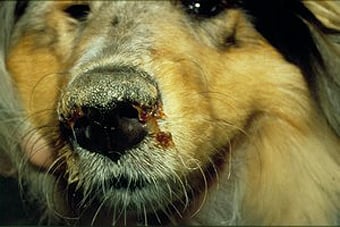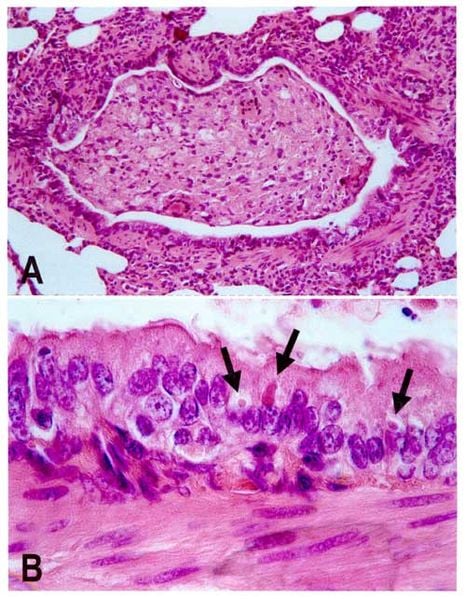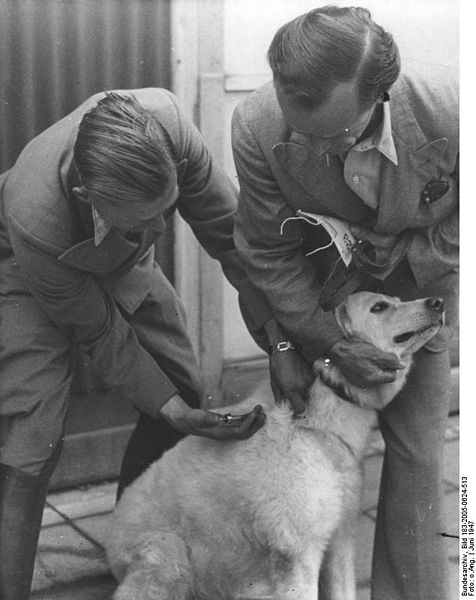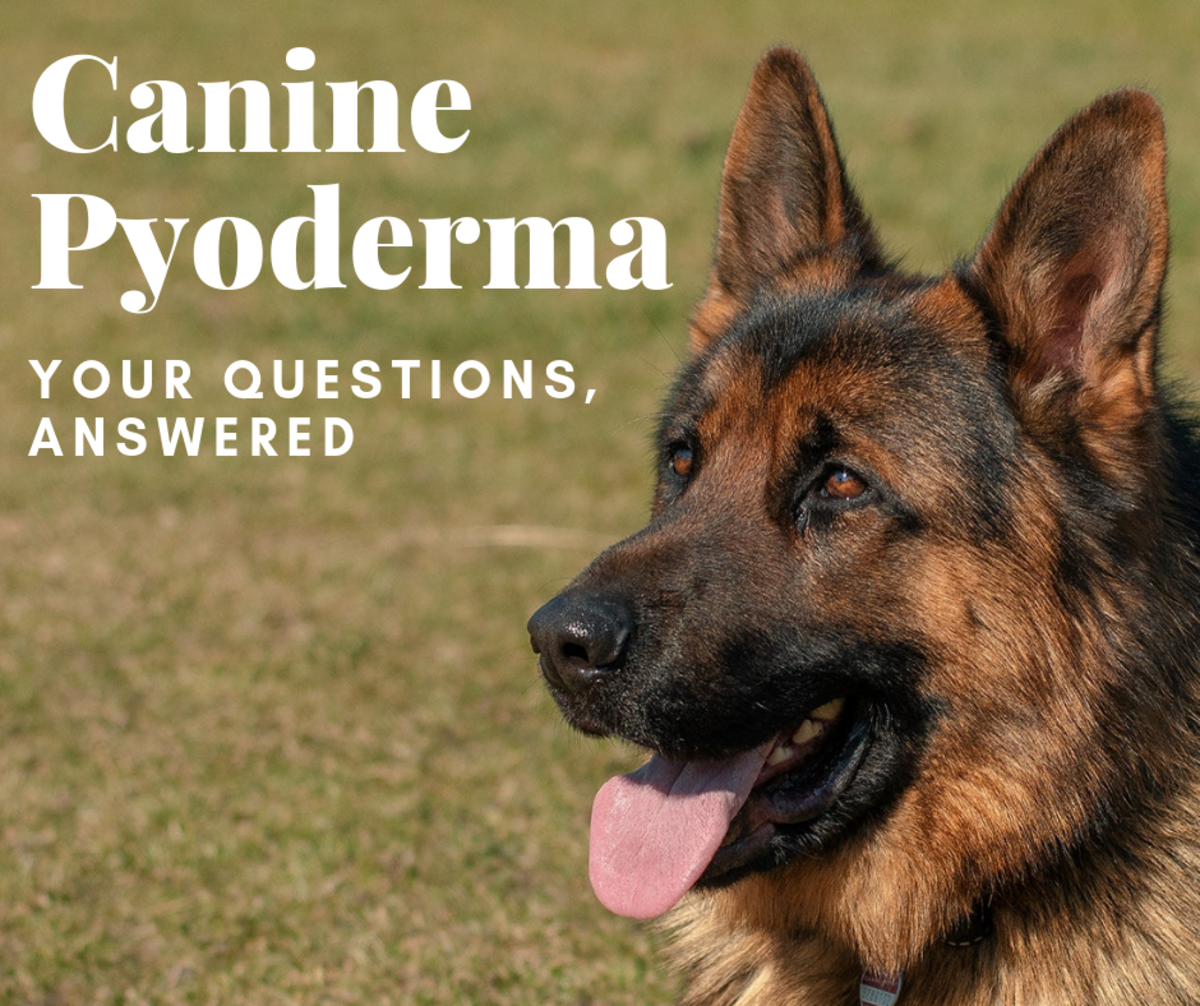Pet Dog Health:What Every Dog Owner Needs to Know About Distemper in Dogs

What Is Distemper and Why Does It Matter?
As part of your pet dog health regime, you may wonder what distemper is or if your dog needs that distemper vaccination. In an email interview, Dr. Cathy Alinovi of Hoofstock Veterinary Service discussed facts about the symptoms, diagnosis and treatment of canine distemper as well as other aspects of this potentially life-threatening virus.
Donna Cosmato (DC):What causes distemper in dogs?
Dr. Cathy: Distemper is caused by a viral infection; puppies are most susceptible to infection between three and six months of age. Canine distemper can also infect ferrets and raccoons.
DC: How long is the canine distemper virus viable?
Dr. Cathy: The distemper virus has a fatty coating (envelope) that is easily disrupted, meaning the virus does not last well outside of the body. A fresh sample at room temperature can still be infectious for three hours. The virus can survive for years if kept frozen and out of the light. But routine disinfection and cleaning readily kill the distemper virus.
DC: How long does a distemper infection last?
Dr. Cathy: The virus attacks the host first at the level of mucous membranes (gums, lips, eyelids), then the respiratory tract, and later causes vomiting and diarrhea or even callusing of the nose and foot pads. Finally, the mucosal phase of the infection is complete and the animal appears to be recovering. Within one to three weeks following the apparent recovery, an infected dog can break with neurological disease.
Depending on the age and immune status of the sick dog, some die during the mucosal phase, while others are mildly affected until the neurological phase.
DC: What other diseases can distemper cause?
Dr. Cathy: Distemper virus invades epithelial (skin) cells, which line the areas where the body touches the environment. Distemper infection in young pups can result in damage to the permanent teeth.
A puppy has adult tooth buds that are developing from epithelial cells; fever and infection associated with distemper can cause irreversible damage to the tooth buds. The result is “enamel hypoplasia” where the adult teeth are stained and have pitted enamel.
DC: Is distemper contagious?
Dr. Cathy: Yes, dogs are typically infected from the virus laden respiratory secretions of acute infected animals – contagious snotty noses. The virus is not durable in the environment but can be spread by direct contact such as aerosol or respiratory droplets, and fomites such as hands, feet or contaminated surfaces.
DC: What are the symptoms of distemper in dogs?
Dr. Cathy: Symptoms include:
Mucosal Phase: gooey ocular and nasal discharge (eye and nose boogies), mild fever, appetite loss, coughing, and pneumonia.
- Respiratory signs alone in young pups are likely due to the kennel cough complex, but distemper is likely the culprit when clinical signs worsen after more than two weeks of treatment.
- Ocular signs include anterior uveitis (swollen eye and eyelid), keratoconjunctivitis sicca (dry eye), and optic neuritis (swelling of the optic nerve, which is seen as sudden blindness.
- Ocular signs are relatively uncommon but when combined with other clinical signs increase suspicion of distemper.
Next Phase: vomiting, diarrhea, along with callusing of the nose and foot pads
Intestinal signs: The suspicion for distemper is increased when GI signs are present in conjunction with respiratory infection and exposure. If the symptoms persist longer than one week, then the chances of distemper viral infection increases.
Skin signs: These are correlated with prognosis or outcome. Pustular dermatitis (skin rash) is associated with a favorable prognosis while nasal and digital hyperkeratotis are associated with progression to the neurological phase and a poor prognosis. Thickened nasal and footpad tissue can be seen in cases of frequent exposure to the strong disinfectants used to sanitize most kennel floors, so interpolate with caution.
Final phase: seizures starting with a “chewing gum fit” (snapping of the jaw or jaw tremors) are classic signs of distemper, especially if they progress to convulsions of the entire body.
Other neurological signs include imbalance, limb weakness and general tremors.The neurological phase can be non-progressive and permanent, or progress to death.Recovery is possible, however, significant brain damage often leaves these pups with poor quality of life. Neurological signs can be present in dogs with no or very mild history of clinical signs.
DC: What can owners do to make their dogs more comfortable?
Dr. Cathy: Placing your dog in the shower with you adds moisture to the air and aids in thinning out respiratory secretions. Providing basic support in terms of nutrition and supplementation in the face of anorexia and GI issues is helpful.
DC: How does the veterinarian make a diagnosis?
Dr. Cathy: Distemper is diagnosed clinically, meaning there are no tests for distemper. Instead, a diagnosis is made by analyzing the symptoms, exposure risks and history. Positive tests help to confirm diagnosis, but due to the elusive nature of the virus, a negative test cannot be used to rule out distemper.
After death, tissue can be tested for the presence of distemper inclusion bodies, which are clumps of virus visible under a microscope. Samples are taken from the eyelid, urinary bladder, and callused nose or footpad.
Special techniques allow for specific antibodies for distemper to tag the virus if present and dye them with a glow-in-the-dark stain. Distemper antibody titers can be done to test for the presence of antibodies to the virus. PCR testing can also be done, but vaccination within two weeks of the test interferes with the result. Cerebrospinal fluid antibody levels can also be checked without interference by vaccination.
Canine Distemper Pathology

DC: Is distemper life-threatening?
Dr. Cathy: Yes, distemper infection can be a mild infection with minor symptoms to a severe disease and can result in recovery, latent infection followed by another phase of the disease, or death.
DC: What is the survival rate of dogs with severe cases of distemper?
Dr. Cathy: It is estimated that 50% of those infected with distemper eventually develop clinical signs associated with distemper. Due to the wide range of clinical signs from mild to death, difficulties with confirmation of the disease and the unknown number of animals that are euthanized without further testing or diagnosis, the true survival rate is unknown.
DC: What dog populations are at highest risk for contracting distemper??
Dr. Cathy: Unvaccinated puppies under the age of 16 weeks are at the highest risks as are those animals exposed to animals of unknown origin or unknown history. Those in shelters are often at the highest exposure risk.
DC: How is it spread?
Dr. Cathy: Dogs are typically infected from the virus laden respiratory secretions of infected coughing/sneezing dogs. The virus is shed in most body secretions, including urine. Due to the nature of the organism, the secretions need to be very fresh, and contact with an infected dog or areas contaminated by an infected dog within 30 minutes could result in transmission. Pregnant dogs that contract the virus can infect their unborn puppies.
DC: Describe distemper treatment.
Dr. Cathy: The only true treatment for distemper in dogs is supportive care and prevention or treatment of secondary infections until the dog’s immune system can respond. If the patient develops a secondary bacterial infection of the lungs (pneumonia), antibiotics help clear the infection, while nebulization and coupage loosen and thin respiratory secretions.
Other supportive medications or treatments can then be used to make the dog more comfortable until the infection clears. Anti-emetic therapy is useful in distemper cases with vomiting and prolonged anorexia in conjunction with nutritional support. Vitamin supplementation with vitamin B and A are helpful in the early course of disease. During the nervous phase of distemper, anti-seizure medication can control seizures if present or steroids may be used to control brain and nerve swelling.
Since there is difficulty in confirming dogs with distemper, assessing the benefits of many treatment modalities or treatments done early in the disease process is difficult.
DC: How are future outbreaks prevented?
Dr. Cathy: Vaccinations prevent distemper outbreaks, and should start at 6 to 8 weeks of age for the first vaccination, followed by every 4 weeks after until 17 weeks of age. Vaccination of the mother before breeding gives the pups natural immunity that should last until they are fully vaccinated.
To decrease the spread and exposure of animals, it is best to quarantine animals with an exposure history and those with suggestive clinical signs for at least one month after clinical signs subside before introducing them to other pets.
DC: Tell the readers about the dog distemper vaccine and how it relates to pet dog health.
Dr. Cathy: Distemper vaccines are typically combined with the following other puppy vaccinations: parvovirus, parainfluenza, adenovirus 2, and occasionally coronavirus and leptospirosis. Distemper vaccine is available in either modified live or recombinant formats. In the modified live vaccines, the distemper virus is changed to induce an immune response but not cause the illness while a recombinant utilizes another virus that is harmless to the host as a carrier for an immune stimulating part of the distemper virus.
DC: Can vaccinated dogs get distemper?
Dr. Cathy: Yes —rarely, vaccine-related distemper occurs. Vaccinial distemper is the development of distemper in the neurologic phase 10-21 days after receiving a modified live distemper vaccine. It is not possible to have a similar response with a recombinant vaccine.
Distemper Vaccination

DC: How long should I wait before introducing another dog into our home?
Dr. Cathy: Any animal with respiratory signs should be isolated for a month or once respiratory clinical signs have begun to improve with treatment in less than two weeks. Since the virus cannot survive without fresh secretions, it is inactivated shortly after leaving the host’s body. The virus is readily inactivated by most commonly used disinfectants. Once surfaces have been cleaned and the source of contamination has been removed, your home should be virus free.
DC: What else do pet owners need to know about the pet dog health and distemper?
Dr. Cathy: The clinical signs of distemper are often unapparent or mild. If there is one dog at a shelter that develops the disease, it is likely there are several infected dogs with mild or no signs. Dogs that have been exposed or possibly exposed should be quarantined for up to one month. Owners should keep puppies that have not had all of their vaccinations away from unvaccinated and wild animals.
About Dr. Cathy Alinovi
Dr. Alinovi is the owner/operator of Hoofstock Veterinary Service and Hoopeston Clinic.
Additionally, she is the co-author of Dinner PAWsible, a cookbook for concerned pet owners who want to be sure they are offering their pets the best possible nutrition.
The information in this article was gathered during an email interview with Dr. Alinovi in November of 2012.
Dr. Alinovi's Clinic Locations
Dr. Cathy Alinovi's main office
Dr. Alinovi's newest clinic location
Learn More About Dog Health Issues
- Help! My Dog Has Canine Pyoderma! Expert Answers to ...
What is canine pyoderma (or German Shepherd pyoderma) and what can you do to help your pet? Dr. Alinovi discusses causes, symptoms, diagnosis and treatment. - Canine Food Allergies: Is Your Dog In Danger of Beco...
Learn how to identify food triggers and help your dog overcome canine food allergies safely. - Why Can't I Give my Dog Baby Aspirin?
Giving human formulated medications to dogs can be a serious mistake. Learn how to protect your pet.
© 2012 Donna Cosmato







